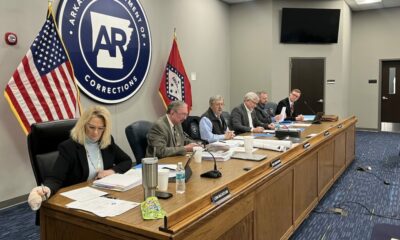Mississippi Today
Experts say Gov. Tate Reeves’ plan will help hospitals, but not uninsured Mississippians

Gov. Tate Reeves, after months of inaction, has unveiled a plan he says will turn Mississippi’s health care crisis around.
However, even some health care experts were stumped by how the Governor’s proposed reforms will work.
The plan, which Reeves announced at a press conference Thursday while flanked by state health care leaders, is essentially a complex scheme to increase extra payments hospitals get for treating patients on Medicaid — and notably doesn’t include Medicaid expansion.
Some Mississippi leaders say Reeves’ ideas aren’t even that new. It’s not certain they’ll be approved, either.
The announcement comes less than two months before Election Day, and after his opponent in the gubernatorial race, Democrat Brandon Presley, has repeatedly stated his intention to expand Medicaid if elected and largely campaigned on the state’s hospital crisis.
Two things were clear at the conference: Reeves claims the changes would put a much-needed $700 million in hospitals’ pockets, and he does not plan to expand Medicaid.
Everything else, however, was not as easy to understand.
How will Gov. Reeves’ plan work?
The plan relies on two major changes that bolster supplemental payments to hospitals for the care they provide to people with Medicaid. Supplemental payments are extra payments hospitals receive to offset low Medicaid reimbursement rates or uncompensated care, which is money hospitals lose caring for patients who are uninsured and can’t pay their hospital bill. Medicaid is a federal-state program that provides health coverage to millions of people in the U.S., including low-income adults, children, pregnant women, elderly adults and people with disabilities. The income requirement for people in Mississippi to qualify is extremely stringent.
The first is a change to the Mississippi Hospital Access Program, which typically pays hospitals for the gap between payments for services rendered for Medicaid managed care patients (which are usually lower) and Medicare patients (which are usually slightly higher). Under the proposed changes, hospitals will instead be paid for the gap between Medicaid patients and people insured by commercial plans, which tend to reimburse at higher rates.
The state Division of Medicaid was granted a similar change to the program in March for outpatient services, resulting in $40.2 million for hospitals. However, Medicaid officials had expected it to generate an additional $450 million. But because Mississippi’s average commercial rate is so low, the payout was much less.
What’s not clear is how, in Reeves’ plan, the average commercial rate results in nearly triple what hospitals typically get for these payments — going from a total of $562 million to $1.522 billion. Reeves didn’t say at the press conference what average commercial rate was actually being used (whether a state, regional or national rate).

When asked what had changed since the spring regarding these rates, Medicaid Executive Director Drew Snyder did not directly answer the question.
“I think the difference is, we got the right people in the room … sometimes it makes sense to get a second opinion,” he said before stepping back in line on stage.
The second initiative modifies the Upper Payment Limit Supplemental Payments, which are aimed at also increasing payments for hospitals that receive low payments from Medicaid. This program will yield an increase of an additional $137 million in fiscal year 2024, according to Reeves.
State leaders did something similar earlier this year after the Mississippi Hospital Access Program projections came in much lower than originally expected, said Tim Moore, former leader of the state hospital association. It resulted in an extra one-time payment of $137 million.
The supplemental payment programs are meant to reduce disparities in insurance payments and the cost of caring for uninsured people. By changing them, the state is drawing down more federal money because of our state’s high Federal Medical Assistance Percentage match, which is the highest in the country at 77.27% because of our state’s high poverty rate. Hospitals have to put up more in “bed taxes” for the state portion, and then the federal government matches.
In other words, if a Medicaid patient receives a service at a Mississippi hospital that costs $100, the hospital is reimbursed $77.27 from federal funds. The remaining $22.73 must be paid by the state – that $22.73 comes from the hospitals themselves in the form of a tax.
Harold Miller, leader of the Center for Healthcare Quality and Payment Reform described it this way: “When the state is paying for a Medicaid service, the state has to find the state share — that 23% — somewhere. They have to find that money, and ordinarily they would have to tax the taxpayers to do that.” Instead, Mississippi asks the hospitals for that money, he said.
In short, hospitals will have to pay $178 million in taxes for Mississippi Hospital Access Program payments to go up by $960 million, Upper Payment Limit payments will yield $137 million and disproportionate share hospital payments — which make up the difference for hospitals that lose money on serving a significant population of Medicaid-insured and uninsured people — will decrease by $230 million because the other payments are bridging the gap. The net gain for hospitals will be $689 million total.
Who will the plan help?
Experts agree this plan will keep hospitals open for longer. Even if it’s unclear how the expected payments will increase, it’s still a significant amount of money — money that hospitals have been asking for for a long time. However, critics say it’s not ensuring more people receive health care.
According to federal data, Mississippi has the highest uninsured rate of people aged 18-64 in the country, as of September. About one in every six Mississippians is uninsured.
Emergency rooms by law cannot turn down people, regardless of their insurance status, who come for care — but doctors’ offices can and so can pharmacies. That means people who are uninsured in Mississippi, one of the unhealthiest states in the nation, cannot receive preventative care or medications that they need. They generally must rely on the emergency room for their health care needs.
“People typically need a lot more care than care in a hospital, and a lot of that care is preventive care… outpatient care,” said Adam Searing, an associate professor at Georgetown University’s McCourt School of Public Policy’s Center for Children and Families whose work focuses on Medicaid. “If you get cancer and you need prescriptions and drugs and outpatient care from a team of specialists, this has nothing to do with that. So, the key differences, this is an issue about the finances of hospitals.
“And Medicaid expansion is about financial security for families.”
How much money is it bringing to hospitals?
Reeves said a little over $689 million will go to the state’s hospitals under this plan.
And although he said Thursday the money would benefit all hospitals, it appears larger hospitals will benefit most, even though most agree that small rural hospitals are the facilities feeling the strain of the health care crisis most acutely.
Additionally, nearly half of the money — 45% or about $309 million — will go to hospitals that have left the state hospital association in recent months. In the spring, after the Mississippi Hospital Association’s PAC made a $250,000 donation to Presley, several hospitals left the organization.
Most of those hospitals’ leaders stood behind Reeves as he announced his plan Thursday.
Is this a new plan?
Reeves said at the press conference this plan has been in the works for four to five months.
According to Tim Moore, former head of the state hospital association, and another state leader, that’s not true.
A year ago, Moore learned of similar measures in Louisiana and brought the idea to state leaders. Lt. Governor Delbert Hosemann recently told Mississippi Today that hospital payment initiatives were discussed by stakeholders last year, but the Division of Medicaid told his office that those changes weren’t possible.
Will it cost the taxpayers anything?
Reeves repeated at the conference that the changes would come at no cost to taxpayers, though he noted Snyder and his division employees are paid by state tax dollars.
That’s mostly true — taxpayers will likely not feel the brunt of this big tax increase for hospitals, according to one expert. Even if hospital charges increase, it should be eaten by the insurance companies and services for people who are uninsured will continue to go uncompensated and be claimed as charity care.
Is it final?
The plan is being submitted to the Centers for Medicaid and Medicare Services for approval. Snyder estimated at the conference that the state would likely hear from the federal government within two to three months. If it’s approved, it would be retroactively effective beginning July 1, 2023.
It’s hard to say what the likelihood of approval is, though several other states have passed similar Medicaid reforms intended to draw down more federal dollars.
One expert said it was unlikely that Mississippi state leaders announced the plan without expecting CMS approval, and historically, the agency has erred on the side of keeping hospitals open — even if it comes at the cost of forgoing expansion.
How is this different from Medicaid expansion?
Medicaid expansion has long been pointed to as a solution to the state’s worsening hospital crisis. Republican state leadership – Reeves most prominently – has staunchly opposed the policy adoption, despite support from a majority of Mississippians.
At the press conference Thursday, Reeves repeatedly incorrectly referred to the program as “welfare,” and claimed the solution to the issue was putting more people in the workforce. He said if more people are added to Medicaid’s rolls, hospitals will keep losing money because Medicaid payments are so low.
That’s better than losing money on people who are uninsured, said Adam Searing, the associate professor whose work focuses on Medicaid.
“These are two disconnected things,” he said. “Reimbursement rates for hospitals and expanding Medicaid are completely separate issues.”
While hospital leaders agree that these policy reforms will make a huge difference for many hospitals in the state, it still might not be enough to single handedly solve the crisis. In other states, such as Louisiana, similar policy reforms work in tandem with Medicaid expansion to create a holistically supported health care system.
The way Moore sees it, the state is putting up $170 million for a $700 million net gain, when with expansion, it could put up $100 million for a $1 billion reward.
States that have not expanded Medicaid have been offered a financial incentive to do so — an estimated $600 million in federal funds over two years.
And, despite more hospitals that will probably be able to stay open as a result of these reforms, uninsured Mississippians still won’t have health care. That means they will have to continue to rely on emergency rooms for their medical care — the most expensive place to receive health care — and uncompensated care costs will continue.
Searing said these reforms “improve the financial bottom line for some hospitals” and keep them open longer, but people are still going without health coverage.
“You’re really not solving the problem,” he said. “You’re just putting a Band-Aid on one aspect of it.”
This article first appeared on Mississippi Today and is republished here under a Creative Commons license.
Mississippi Today
Program helps students with disabilities forge paths to careers
‘I wouldn’t have found them otherwise’: Program helps students with disabilities forge paths to careers
Matthew Devers, 18, describes his current job as “very brute force.” He’s in a welding program, working part time while completing his associates degree at Mississippi Gulf Coast Community College.
He says it wouldn’t have been possible without the pre-employment training and services program he joined after high school. Pre-ETS is a program that provides students with disabilities education and experience to help them enter post-secondary education and/or the workforce. Devers, who is autistic, says “I wouldn’t have found them otherwise.”
People with disabilities make up 13% of the country’s population as of 2024. The employment rate for people with disabilities is lower than for people without. According to the Bureau of Labor Statistics, the 2024 employment-population ratio for disabled people between 16 to 24 years old is 37.4%. By comparison, the employment rate for non-disabled people is 65.8%.
Pre-ETS provides job exploration and counseling, work-based learning experiences, counseling opportunities for enrollment in comprehensive transition or postsecondary education programs, workplace readiness training, and instruction in self-advocacy.
In 2014, Congress amended The Rehabilitation Act of 1973 through the Workforce Innovation and Opportunity Act, expanding the population of students with disabilities that vocational rehabilitation agencies may serve. This gave birth to the pre-ETS program, which is funded by state vocational rehabilitation agencies.
Nationally, pre-ETS services are underutilized. The Hechinger Report found that in 2023, 295,000 students were using pre-ETS when it’s estimated that 3.1 million were eligible. Often, the report found, parents are even aware it exists.
The Office of Vocational Rehabilitation is currently serving 3,382 students, 2,053 of whom are in the pre-ETS program. How many it could potentially serve isn’t known, but the Mississippi Department of Education said there are 20,994 students between the ages of 14 and 21 in special education. That’s the age group pre-ETS serves.
If aware of pre-ETS, families can request thatfor their child to join the program through a school counselor or school transition staff. If the student doesn’t have an open vocational rehabilitation case, they can reach out to a local VR transition counselor or vocational rehabilitation for the blind counselor.
Jennifer Jackson, the executive director of the Office of Vocational Rehabilitation, said she is optimistic about the direction of pre-ETS in Mississippi. “I feel like our state is constantly improving and constantly seeking out ways to help these individuals be successful,” she said.
The recent cost-cutting measures from the Trump administration have alarmed some disability rights advocates. As part of its sweeping cost-cutting spree, the Department of Government Efficiency, or DOGE, canceled at least two grants researching school-to-work transition services for youth with disabilities, including two multimillion-dollar contracts for studies on outcomes for students with disabilities after high school graduation.
“While we are aware that staffing changes have taken place within the Department of Education (DE), where RSA is housed, we have not been informed of any direct impact to Vocational Rehabilitation (VR) funding at this time,” Jackson said in a statement. RSA refers to the Rehabilitation Services Administration.
Jackson said these services provide essential help for young people with disabilities who often struggle learning skills that people are not disabled can take for granted. She said they’re also key for improving employment outcomes for people with disabilities.

To be eligible, a student must: be between ages 14 to 21; have a documented disability, 504 plan to ensure the child receives accommodations and access to the learning environment; or Individualized Education Program plan; and be enrolled in a recognized educational program. Applicants must complete a Pre-ETS Referral Form, have a parent or guardian sign a release of information, and have a copy of the student’s documented disability, 504 plan, or IEP plan.
OVR partners with 13 organizations and nonprofits across Mississippi to deliver pre-ETS programs. One of them is the Transition to Adulthood Center on Learning, the same program Devers was in. The center is part of the Institute for Disability Studies at the University of Southern Mississippi.
Beth Robertson, the center’s executive coordinator for transition, described the program as a collaboration between families, schools and state agencies. “We can always work together even more, increase our involvement more, we would love to see that,” she said.
This article first appeared on Mississippi Today and is republished here under a Creative Commons Attribution-NoDerivatives 4.0 International License.![]()
Mississippi Today
Government secrecy tends to bite Mississippi in the butt. It’s happened again
The state Senate Republican leadership didn’t plan to fail on a Mississippi tax overhaul. It failed to plan.
And when pressed late in the 2025 legislative session to come up with a proposal to counter the House Republican leadership’s sweeping bill, Senate leaders did so behind closed doors and hurriedly.
The result: a majority of legislators passing a tax overhaul bill full of math errors that accidentally did what Senate leaders didn’t want. And it stripped out safeguards for taxpayers that both the House and Senate leadership said were prudent.
No matter how much Gov. Tate Reeves praises House Bill 1 as “one big, beautiful bill,” borrowing a phrase from President Trump as he signed it into law, it was passed through secrecy, subterfuge and error, not representative democracy.
Had the Senate perhaps taken a little more time, allowed more input from and access to its strategizing from rank-and-file lawmakers, and who knows, maybe even a little crowd-sourcing allowing the public to scrutinize the bill before passing it, maybe the blunder could have been prevented.
READ MORE: OOPS! Senate sent House an income tax bill with typos. House ran with it. What’s next?
And while House leaders should receive praise for coming up with an initial public-facing tax overhaul plan through months of public hearings and forums, that’s not what was passed into law. House leaders played a game of secret squirrel to pass the Senate’s mistakes into law. Then instead of negotiating in good faith to fix the problems, House leaders tried to shanghai the Senate in backroom negotiations to pass a few plums they wanted, such as legalized online sports betting and a sales tax increase.
The end result: Historically bitter infighting among state GOP leaders to the point they couldn’t even pass a state budget, their main job. And we have communications between Mississippi’s top legislative leaders and governor, all Republicans, that these days are often reduced to mean tweets or Facebook posts about each other, not earnest negotiations.
READ MORE: The Typo Tax Swap Act of 2025 may be the most Mississippi thing ever
Mississippi government’s default setting is secrecy, from public records and meetings to access to elected officials, and it has never served our citizens well. From a black-ops agency that spied on its citizens for nearly two decades to festering, generational government corruption that has cost taxpayers hundreds of millions of dollars, secrecy is neither good politics nor good policy.
Major, sweeping state policy should be conducted in the open and with public input. But as the national and world economies plunge into turmoil that is sure to impact Mississippi, our new tax code lacks safeguards that both House and Senate leaders said were needed — all because of secrecy and lack of planning and communication.
This article first appeared on Mississippi Today and is republished here under a Creative Commons Attribution-NoDerivatives 4.0 International License.
Mississippi Today
Ward 6 council candidates face the image of south Jackson versus the reality
Driving down roads in south Jackson in recent weeks, residents were inundated with placards of smiling faces and names in bright, bold fonts of people hoping to be the next Ward 6 councilman.
In some neighborhoods, the streets were as littered with campaign signs as they are overgrown lots and abandoned properties in between neatly kept homes.
“The homes in the surrounding area and businesses in Ward 6 have been decimated. It looks like a bomb went off,” said Sylvia Walker, Ward 6 board member for the Jackson Association of Neighborhoods. “We’ve seen the businesses hollow out and nothing come back in. It’s disheartening. It’s sad.”
Walker said the image of south Jackson must be interrogated. Not enough people are talking about the good happening in Ward 6, she said.
“South Jackson is very diverse and not just one specific area,” said Walker. “I think the biggest misconception is that south Jackson is just full of dilapidated homes, and the people are poverty-stricken and destitute, and that’s not true.”
Ward 6 has the largest population of Jacksonians, with just over 23,000 people. It also has the highest number of Black residents, according to data from the City of Jackson’s website.
Jackson also has a high number of abandoned properties owned by the state. According to data from the Secretary of State’s office, there are about 1,900 tax-forfeited properties in the City of Jackson.
There will be a Democratic runoff on April 22 between two candidates for the Ward 6 city council seat. Emon Thompson Sr. garnered 714 votes and Lashia Brown-Thomas came in second with 652 votes. Voter turnout was low, with less than 3,200 votes cast in a ward with a voting age population of more than 16,000. There were nine contenders for the coveted council seat, more than any other council race.
Candidates for the coveted Ward 6 seat envision a more beautiful, thriving south Jackson. After a stacked primary, two candidates have made it to the runoff to replace Aaron Banks, former council person who faces criminal charges for allegedly accepting cash bribes in exchange for his vote on a development project. He pleaded not guilty.
Banks is familiar with the image problem in south Jackson. He said he’s made progress with more demolitions and landscaping work done than others in the past. This includes the demolition of Casa Grande Apartments and Appleridge Shopping Center.
“I’ve always said that I would serve two terms, and we got a lot of work done,” Banks said in a recent interview with Mississippi Today.
Brown-Thomas said that crime and blight are the biggest issues affecting Ward 6. The law enforcement officer wants to hold people accountable for their part in the perceived image of a decaying south Jackson.
“The city has codes, and if these people are not holding up to the codes, they need whatever punishment there is,” Brown-Thomas said. “If they aren’t holding the property up, then they should not have the property.”
She said that if she’s elected, she’ll work to get police officers higher wages, and will remain transparent and available to constituents.
“It’s not going to happen overnight, but it will take some time,” Brown-Thomas said. “I’m not saying it’s going to come in a year, not even two years, but we have to address the issues first, then everything else will fall in line.”

Thompson Sr., a business owner and retired veteran, said that a lot of the issues with blight comes down to enforcement.
“We need to, first of all, clean up our blighted properties by using the laws that we already have,” Thompson said. “The city already has ordinances with enough teeth to deal with blight.”
South Jackson voters don’t turn out like they should, he said, which can lead to a distrust in the system. He hopes, if elected, to be able to reach constituents where they are and keep them a part of the process in restoring their communities, like water improvement or curbing crime.
“Out of the 40 something thousand people that’s in south Jackson, maybe 3,900 people vote in the municipal elections,” he said. “They don’t have faith in the government anymore.”
“…If there’s a reason why we’re not getting any services out here, then I want to make sure I communicate that with a constituent so they can continue to have hope,” he said.
Representative Ronnie Crudup, Jr., D-Jackson, said that residents’ migration out of Jackson creates bigger issues for communities.
“To me, blight is just a symptom of a larger problem. The people are leaving the city of Jackson, and the population is decreasing,” Crudup said. “When people leave the properties, you end up with squatters and vagrants who move into these properties and tear them up.”
Crudup has been renovating and demolishing blighted properties in south and west Jackson for nearly eight years. So far, he said he’s renovated about 35 homes.
“Even though we are demoing and tearing down one or two properties, when people leave, that leaves other ones there,” he said. “You got all these blighted properties all around south and west Jackson, and some even in parts of north Jackson now, because people are leaving.”
He said the one thing that’s needed most: more funding from all levels of government for blight mitigation work.
“There needs to be more money from the legislature, but there needs to be more money allocated from the city council too,” Crudup said. “I think the city is going to have to take clean up efforts to a higher circumstance, and let the legislature see that they’re serious about this, and also get the county involved and let them know ‘Hey, we need all the help we can get.’”
And, the perception that city leaders have abandoned south Jackson is not necessarily right. Former Jackson Mayor Harvey Johnson said that blight is an issue that affects not only south Jackson but all parts of the city. Mitigating blight is going to take an intergovernmental approach, he said.
“I know that in some cases, some people feel they’ve been sort of abandoned, but I don’t think that’s the case,” Johnson said. “It may be a lack of resources to attack the problem and it’s going to require all governments to work together.”
Walker said she remembers when the city’s southern boundary changed and her neighborhood, which had been part of Byram, came inside Jackson city limits. A small portion of her ward was annexed by the city of Jackson in 2006 as part of Byram’s reincorporation. In the last couple of decades, she said she’s seen people be forced out of their homes due to the recession. Others simply chose to leave.
“We’ve had a turnover, but the neighborhood is still relatively stable,” Walker said. “When we moved in, a lot of people moved out.”
Walker said that while her neighborhood isn’t struck by blight, she sees abandoned properties while making her way through the community and near her church.
When thinking of a candidate that she would want to vote for, Walker said she’s looking for a good communicator who can be an advocate for the ward.
“We need someone that’s forward thinking. Someone that has the best interests of the residents of south Jackson and an understanding of the vast diversity of the ward,” she said. “Someone that’s able to work with other members of the City Council. Someone able to work with our board of supervisors and state legislators to find solutions to some of these issues.”
Banks said that his greatest achievement as city councilman was hosting quarterly town hall meetings to inform his constituents on the importance of ordinances and legislation created to better their lives.
“There’s one piece of legislation that deals with overhanging tree limbs and limbs. That idea came from a constituent,” he said. “When you see constituents being able to give informed ideas on legislation, which is the job of a council member, I think that’s an achievement because then what that says is there’s involvement in the process.”
“I hope the next person will understand that communicating with the people is key, and that the people of Ward 6 are resilient,” Banks said. “As long as they continue to communicate and stay in the scope of their job and work with the administration, there’s a lot that can be done.”
This article first appeared on Mississippi Today and is republished here under a Creative Commons Attribution-NoDerivatives 4.0 International License.![]()
-

 The Center Square6 days ago
The Center Square6 days agoCA fails audit of federal programs, 66% of COVID unemployment benefits in question | California
-

 News from the South - Arkansas News Feed7 days ago
News from the South - Arkansas News Feed7 days agoArkansas prison board approves contractor search for Franklin County prison
-

 News from the South - Alabama News Feed7 days ago
News from the South - Alabama News Feed7 days agoAlabama House passes public school cell phone ban
-

 News from the South - Alabama News Feed5 days ago
News from the South - Alabama News Feed5 days ago‘Hands Off!’ Protest Held in Huntsville Saturday | April 5, 2025 | News 19 @ 9 P.M.
-

 News from the South - Oklahoma News Feed7 days ago
News from the South - Oklahoma News Feed7 days agoRetired Cops Sound Alarm on Pension Board Shift
-

 News from the South - Florida News Feed6 days ago
News from the South - Florida News Feed6 days agoFlorida student accused of punching deputy in the face
-

 News from the South - North Carolina News Feed6 days ago
News from the South - North Carolina News Feed6 days agoState appeals court finds merit in protests of nation’s last unsettled election | North Carolina
-

 News from the South - Missouri News Feed7 days ago
News from the South - Missouri News Feed7 days agoKansas City-area man deported after visiting grandfather’s grave in Mexico














































